- Home
- Brian Garfield
Threepersons Hunt Page 7
Threepersons Hunt Read online
Page 7
“I wouldn’t take the son of a bitch on a Christmas tree,” Victorio said. “You find him, you’re welcome to him.”
6.
Victorio’s office was a cubbyhole. Squeezing inside, Watchman said, “Then you wouldn’t like to buy the idea that he might have been innocent.”
“I wouldn’t know anything about that. I wasn’t around here when he killed Calisher. I was still in law school. But if somebody told me Joe was innocent I’d have to laugh a little. Joe was born guilty.”
“Of murder?”
“He beat up on a lot of people. Calisher happened to be the first one who died from it.”
“He didn’t beat Calisher up. Calisher was shot.”
“So?”
“It just makes you wonder,” Watchman said. “He always liked to use his fists, didn’t he.”
“He’s one hell of a shot with a rifle.”
“But he never shot at a man that you know of, did he?”
Victorio said, “Not that I know of, no.”
“Then why all of a sudden the gun?”
“According to the testimony it was because the gun was handy. Calisher had it on the wall. He had guns all over the wall.”
“I thought you weren’t there.”
“I was at the trial. That was months after the murder.”
There was hardly room between the shelves of law texts for the tiny desk and two chairs. A work lamp hung from a cord above the desk. The small window was set high and the sky beyond was obscured by a tangle of mesquite branches. The wooden nameplate on the desk said THOS. JEFFORDS VICTORIO, ATT’Y. Watchman said, “That’s a handful of a name.”
“I’ve thought about changing it.” Thomas Jeffords had been the white man who’d made peace with Cochise.
“You hate Joe,” Watchman said. “Why?”
“Look, if it wasn’t for that stupid fool and his temper, Maria Poinsenay would be alive right now.”
“Maria Poinsenay—that’s Joe’s wife, her maiden name.”
“The son of a bitch talked her into marrying him when the whole tribe was against it.”
“Why were they?”
“Wrong clans for marrying,” Victorio said. He adjusted the lapels of his suit jacket when he sat down. “Look, you want to find him? Have yourself a look around old Will Luxan’s place. Will Luxan never could stand Joe but that never made any never-mind to Joe, he’d probably head right back to old Uncle Will like a homing pigeon.”
“Luxan’s his mother’s brother?” Ordinarily in the clan and family arrangements that relationship was not a particularly close one.
“Actually they’re not related. Will Luxan was an old buddy of Joe’s old man. Luxan comes from someplace way over in New Mexico but he’s lived here maybe forty years. He sort of got adopted by Joe’s grandfather. Later on he married into the tribe. They call him Tio Will but he’s nobody’s real uncle. Incidentally Joe’s old man was a San Carlos, he moved up here when he married into the clan here.”
“So Maria belonged to Joe’s father’s clan and that’s why they weren’t supposed to marry each other?”
“Yeah. What are you, Hopi?”
“Navajo.”
“Then you’ve got the same setup.”
“More or less. You think there might be a chance Joe would head for his in-laws’ in San Carlos?”
“I doubt it. They never could stand him.”
“You must have been soft on Maria Poinsenay,” Watchman said; he wanted it out in the open.
“She was pretty deep in my guts, yeah.”
“But she married Joe.”
“Joe married her. He was a big hero back from the Army and I was way the hell down in Tucson at law school.”
“Are you San Carlos?”
“No, I’m White Mountain but there’s branches of my clans down on the San Carlos and I used to work down there summers. I met her the summer before Joe came back from the Army.”
“But then you had to go back to law school and he moved in on her.”
“Man, I wish I knew how in hell he ever forced her into it.”
“Forced her?”
“Well I mean she wasn’t stupid. Picking him over me?” It was evident Victorio still had a few things to learn about the ways of the human heart. Self-consciously he adjusted the hang of his suit jacket.
“Tell me about Joe. What’s he like? How does his mind work?”
“It doesn’t. He’s a reacter. Lets his feelings push him around like a wind pushing a tumbleweed.” Victorio seemed pleased with the image; he paused to savor it. “He was always getting into fights over nothing at all. Getting drunk and beating up on people if they looked at him cross-eyed.”
“All that stopped after he got married, didn’t it?”
“I guess Maria kept him in line. Like I said she was pretty bright. She’d know how to keep him out of jail.” Rage began to simmer at his lower lids again.
Watchman said, “She died on the highway and the next day Joe broke out of Florence. Now there’s got to be a connection.”
“Sure. He got the news and went berserk. It’s not the first time. It never took much to make him fly off the handle—you never saw a temper like that son of a bitch has got. I’ve still got a scar on my arm where he went through my shirt with a busted beer bottle.”
“What was the fight about?”
“You’d have to ask him. I was having a beer minding my own business and all of a sudden he was all over me.”
“Were you both dating Maria then?”
“I had the inside track. Maybe that was what set him off. God knows what goes on inside that pea-brain of his.”
Watchman didn’t ask who’d won the fight. Victorio didn’t look like much of a brawler.
Watchman said, “All right, let’s say he went berserk. That prison breakout was pretty well planned, but let’s assume he was just lucky. He’s a little crazy and he can’t stand prison any more so he busts out. Then what?”
“All I can tell you is try Will Luxan. Joe always thought the world of Uncle Will. Other than that I’ve got no ideas. For all I know he’s halfway to China now—either that or trying to rig up a bomb to blow up the prison with. I wouldn’t put that past him.”
“It sounds a mite fanciful.”
“When Joe gets mad he hits anything within reach.”
“I’ll bear that in mind. Who else knew him well?”
“Oh all kinds of people, I guess. Jimmy Oto, he’s still around Whiteriver. They used to hang out together at the roadhouse just after Joe got out of the Army. That old mealymouth LaSalle over at the mission might give you an item or two, but whatever he tells you, use a grain of salt. The old bastard’s still somewhere in the Victorian age, he’ll tell you all about the plight of the noble savage. You talked to Angelina yet?”
“His sister? No. I understand she’s in Showlow.”
“She’ll be back by after-supper drinks time. She works at the roadhouse. You ought to treat her with the kind of respect you’d show a skittish mustang filly.”
“Why? What’s wrong with her?”
“In that family they’re all a little crazy in the head. Joe’s brother was killed in Korea going up against a whole Red Chinese battalion single-handed with a Browning automatic rifle. He got the Medal of Honor for it but he also got dead.”
“What does Angelina do over there? Wait tables?”
“A little of everything. She sings a song now and then, she serves beer and setups, she runs the cash register. Sometimes she just sits in the corner. Hell I don’t know. The place belongs to Will Luxan and I guess he’d keep her on whatever she did. He kind of feels obligated to the family.”
“I understand she’s not married.”
“She married a white man back, oh, six-seven years ago. It didn’t take, they got divorced maybe six months later. She’d be a good-looker if she put some weight on, but every man I know of that’s tried to date her up ended up with a black eye sooner or later. Anyhow nobody wants
to marry into that clan, they haven’t got two pesos to rub together. Joe and Angelina, they’re the last of the line.”
The thought made Victorio grin. “And high time too.” Then his smile coagulated. “Listen, I’d kind of like for Joe to get found, so if you need a hand you just let me know. You’ll find it’s a taut town up here, most folks don’t like to hear any questions about anything at all from outsiders. I’ll see if I can help offset that a little.”
“Thanks,” Watchman said. Then he went out.
7.
Watchman had the feeling there was going to be no way to untangle the Threepersons chase from the water dispute. Water was the basis for survival in this country—and Joe Threepersons was astraddle the whole mess: an Apache who’d worked for the Rand interests, a Reservation Indian who’d been convicted of murdering the Rand foreman.
This Reservation fell away from northeast to southwest. From the high escarpment of the Mogollon Rim it plunged through timbered mountain country of streams and lakes; down through scrubby hills; across these valleys where Whiteriver and Fort Apache squatted in the dust; out along red-clay plateaus, then down the steep pitch of the Salt River Canyon. Beyond that river was the San Carlos which was a separate Apache Reservation of an area some two hundred thousand acres larger than the Fort Apache Reservation; but the San Carlos was poor land mostly, if not desert then something close to it. The fortunes of the Arizona Apache tribes were dependent mainly upon the natural wealth of the White Mountain high country: the timber, the grass and above all the water.
But across the Reservation boundary the Anglo ranchers had drilled their wells, depleted the water-table and cut off the flow into the string of reservoirs that not only gave the Apaches a lucrative recreational enterprise but stored up water for all the farm country below. Without irrigation from the lakes, the farms would blow away like Okie acres in the dust bowl.
By now half the Apache lakes were cracked mud flats with shallow ponds in their centers. Stunted fields of corn and greens stood withered under the sun and if the newspapers were right it would be the worst crop year in twenty-five years on the Fort Apache Reservation, come harvest time.
The Rands claimed the Indians weren’t making good use of the water when they did have it. It was true enough. Watchman had seen it on the Navajo Reservation and it was the same thing here: the grandsons of Cochise and Geronimo were not farmers, they hadn’t been born to the soil and even under expert agricultural guidance they still managed to ruin half the land they farmed by neglecting to terrace it, by refusing to rotate crops and by stripping it for planting so that the midsummer cloudbursts inevitably scraped off all the topsoil and left the Apache farmer with nothing but eroded rock shelves and sand and clay. But they were learning. It took time: you didn’t make farmers into Indians in two generations and it wasn’t realistic to expect the reverse to happen any faster.
In a land of scarce rainfall water meant everything: without it land was valueless and therefore water was more valuable than the land itself. But in the century of the Indian Bureau the water rights of the western tribes had been reduced steadily and both the rights and the water had evaporated.
The Anglos who believed in things written on paper had the words in their favor. The treaties by which the Indians occupied their Reservations had been drawn up a century ago in a time when it had not occurred to anybody to specify any relationship between the land itself and the water that fed it. Water rights were not mentioned in the treaties or the government-tribe agreements or the Acts of Congress which shaped the legal boundaries of Federal-Indian relationships. It was on the strength of these omissions that the Rands based their arguments: there was no mention of Indian water rights in any of the treaty agreements and therefore, if rights were not mentioned, then there were no rights.
To Rand the issues were financial. To the tribe they were life-or-death. It was possible the Calisher murder had nothing to do with water rights but the complications which now ramified from it had everything to do with them. The tribe would aid and abet Joe Threepersons not merely because he was a member of the tribe but also because his enemies and the tribe’s enemies were the same. And if by hampering white justice the tribe could help put Charles Rand’s tail in a crack, the tribe would make a lot of sacrifices to see that happen.
What it meant, in the end, was that Joe Threepersons was going to be damned hard to find.
CHAPTER FOUR
1.
THE WIND blew the smell of exhaust across the apron of the Shell station.
It was a two-stall garage with one pit and a stall without a lift, a concrete floor with a grease-clogged center drain. A can of kerosene stood in the front corner with a potato stuck over its spout. There was only one man on duty and all Watchman could see of him was his bowed back and legs. The man’s head was out of sight under the yawning hood of a half-ruined Ranchero.
Fifty yards north of the station stood the roadhouse, the Broken Arrow, set back behind its dusty parking lot. It was a big rectangle sided with brown boards; there were no windows at all. The name of the place was painted in a faded crescent across the movie-set false front and an illuminated Coors Beer sign overhung the front door. The place had a forbidding aspect, like a slaughterhouse: the grim solid walls without windows gave the impression someone was ashamed of what went on inside.
It had to be fairly new because it had only been legal to sell whiskey on Reservations for a few years but the Broken Arrow looked as if it had stood there as long and as immutably as the mountains behind it.
Watchman got tired of waiting and went inside the stall to show himself.
“Be with you in a sec.” The man was touching a bare finger to the engine block—testing the cylinders by the old, but still best, method. If an engine is missing on one cylinder, touch a hand to each cylinder. The one that isn’t hot is the faulty one. But you need tough skin.
“I’m all alone here right now. Sorry to keep you waiting.”
“It’s all right. I’m looking for Will Luxan.”
The mechanic looked up over his shoulder. A chinless youth with inquisitive eyes. “He just left. He’s either over at the Arrow or you find him home, house back there in the trees.”
Watchman thanked him and asked him to fill the Volvo and check under the hood when he had a minute. He left the mechanic in communion with the Ranchero engine and walked across the pebbled dust toward the roadhouse. The sun was dropping toward the Salt River district and on the red macadam road the inbound traffic was heavier than it had been. The automatic jabbed his spine when he went up the porch steps to the brown door.
The Broken Arrow had red lenses in the ceiling and fake oil lamps along the walls and old posters of Jeff Chandler and Jimmy Stewart fighting the Indian wars. It was a low-budget imitation of a nightclub with short picnic tables and benches in place of booths, and rickety wooden stools along the bar. There was a little bandstand raised eight inches off the floor at the far end of the room beyond the end of the plank bar which ran two-thirds the length of the right-hand wall. The place was redolent of stale beer and tobacco smoke. It was too dark to tell how clean or filthy it might be.
Gradually his eyes adjusted and peopled the room with five-drinkers at the bar, two men at a back table, a one-armed Apache tending bar and a girl at the register in a long black dress with a white imitation-lace apron.
She had very wide cheeks and the vivid lipstick didn’t suit her. Watchman asked her about Luxan and she pretended she hadn’t heard him. He asked again and she said, “He ain’t here.”
“Then I’ll try his house.” He began to turn away.
“No …”
“Why? Isn’t he home?”
Her face closed up, intransigent in bitterness. “You just got to bother him, don’t you.”
“You think he’s got something to hide?”
“Oh for God’s sake.” Irritably she kicked the long skirt away from her feet with a backward flick of her heel. She couldn’t have been muc
h more than eighteen.
“What makes you think I’m going to make trouble for him?”
“I heard about you,” she said.
“What did you hear?”
“Nothin’.” The surly downward glance; now she was a fourteen-year-old, the cabaret costume and lipstick forgotten because she was rattled.
“What are you to Mr. Luxan?” He threw in the mister to reassure her.
“Daughter. What difference that make to you?”
“Well I don’t mean your daddy any harm.”
“That ain’t the way I heard.”
“Take my word for it.” He left the place, thinking at least she had spunk; sense always came later.
2.
In Indian society there was fierce competition for status and prestige; success was important and was measured in symbols or in possessions. Ambition was not frowned upon but greed was—you found no moneylenders within the tribes and that was what enabled white traders to get rich because they were the only ones who charged interest for money borrowed.
The size of Will Luxan’s house was a surprise and he hadn’t made that kind of money by amassing capital and lending it out. Therefore he was a man of imagination and a hard worker. The house was half again the size of any house Watchman had seen in the town proper. It probably had four bedrooms and more than one bathroom.
It was washed in pink stucco and had a red roof of half-round tiles. A degree of care had been used in situating it; the big old trees that crowded up close against it had been there a lot longer than the house had. Luxan had his own private cottonwood grove here.
Four cars browsed in the driveway, none of higher rank than a three-year-old Pontiac sedan. There was a basketball on a patch of grass in the yard and a swing hung from a cottonwood limb, made of a length of rope and an old truck tire. A nondescript but well-fed puppy wagged its tail at Watchman. From the profusion of cars and other evidence he judged Luxan had a sizable number of children.

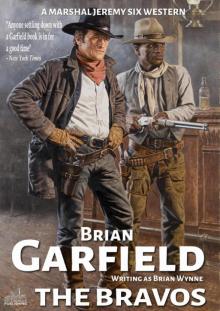 Marshal Jeremy Six #3
Marshal Jeremy Six #3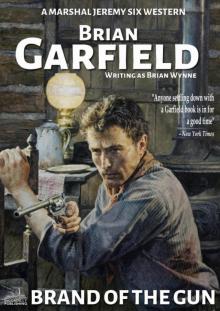 Marshal Jeremy Six #6
Marshal Jeremy Six #6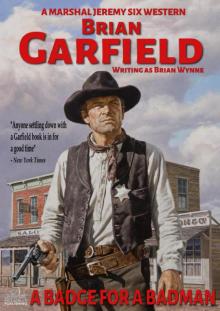 Marshal Jeremy Six #5
Marshal Jeremy Six #5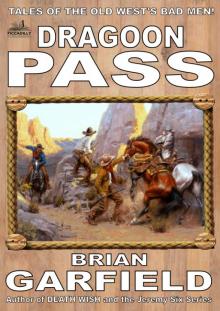 The Outlaws 2
The Outlaws 2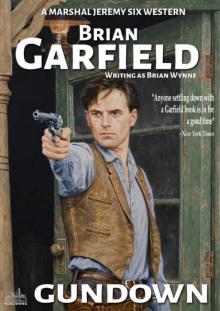 Marshal Jeremy Six #7
Marshal Jeremy Six #7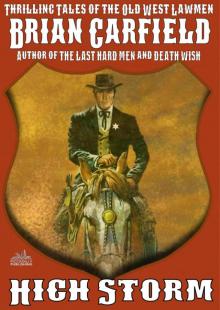 The Lawbringers 4
The Lawbringers 4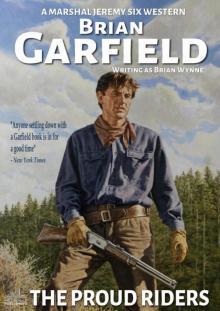 Marshal Jeremy Six #4 the Proud Riders
Marshal Jeremy Six #4 the Proud Riders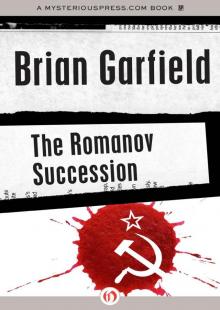 The Romanov succession
The Romanov succession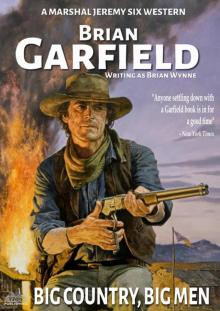 Marshal Jeremy Six #8
Marshal Jeremy Six #8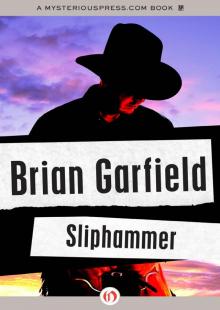 Sliphammer
Sliphammer Line of Succession
Line of Succession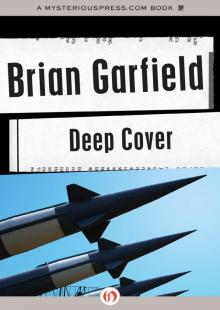 Deep Cover
Deep Cover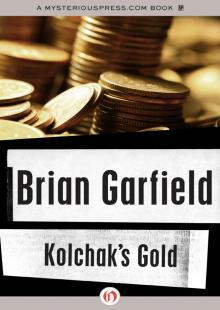 Kolchak's Gold
Kolchak's Gold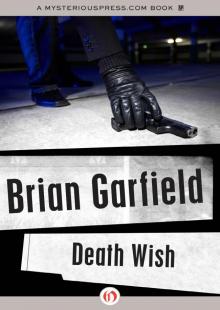 Death Wish
Death Wish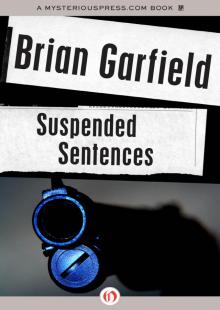 Suspended Sentences
Suspended Sentences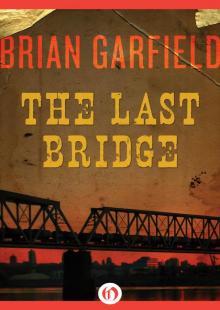 The Last Bridge
The Last Bridge Relentless
Relentless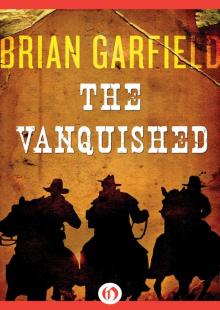 The Vanquished
The Vanquished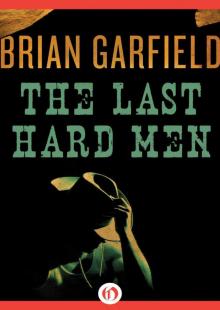 The Last Hard Men
The Last Hard Men Hit and The Marksman
Hit and The Marksman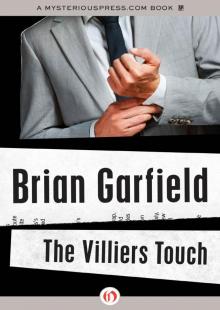 Villiers Touch
Villiers Touch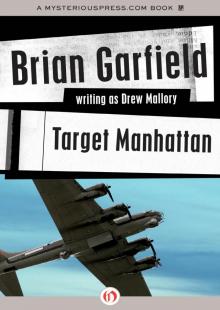 Target Manhattan
Target Manhattan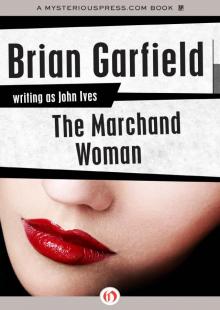 Marchand Woman
Marchand Woman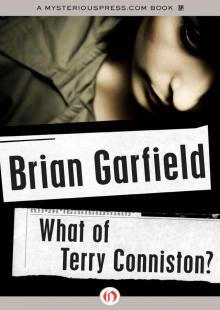 What of Terry Conniston?
What of Terry Conniston?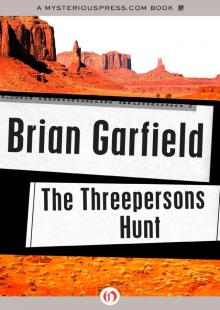 Threepersons Hunt
Threepersons Hunt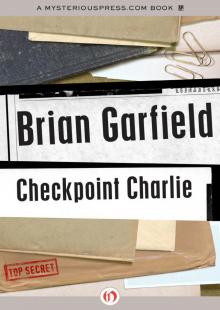 Checkpoint Charlie
Checkpoint Charlie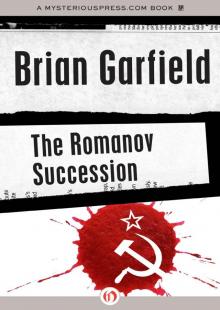 Romanov Succession
Romanov Succession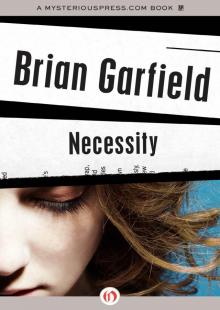 Necessity
Necessity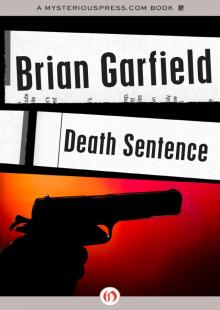 Death Sentence
Death Sentence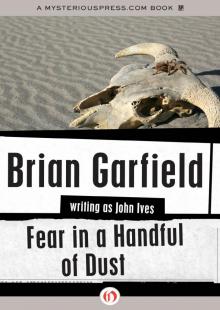 Fear in a Handful of Dust
Fear in a Handful of Dust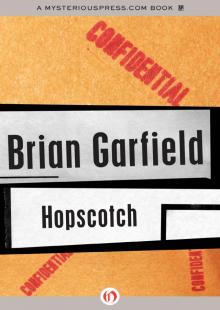 Hopscotch
Hopscotch